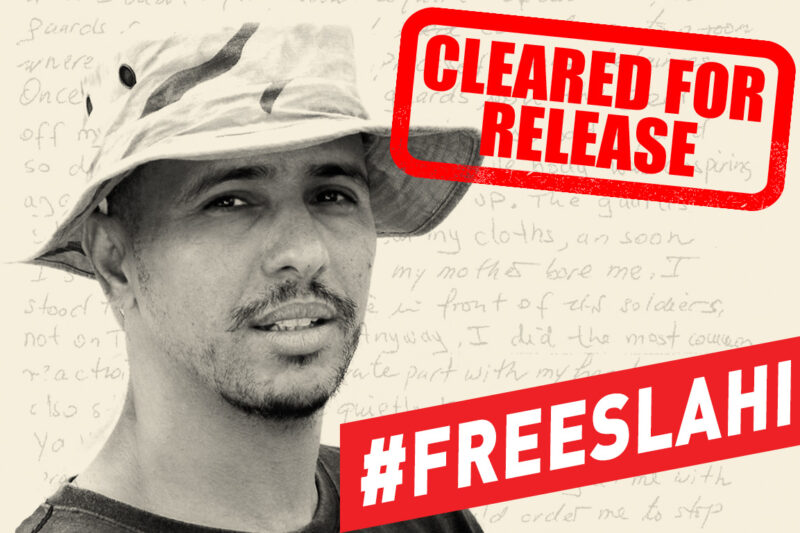Mohamedou Ould Slahi’s Long Nightmare at Guantánamo Is Finally Coming to an End


After 14 long years languishing at Guantánamo without charge or trial, Mohamedou Slahi has finally been cleared for release.
Today the Periodic Review Board — a panel of national security, intelligence, and other officials — made that decision after determining that Slahi poses no significant threat to the United States. The government of his native Mauritania has said that it would welcome him home.
Slahi is the author of the best-selling memoir “Guantánamo Diary,” and he appeared before the Periodic Review Board on June 2. We provided the PRB with a slew of evidence and support for Mohamedou’s release. We especially appreciate the letter of support from a former U.S. military guard at Guantánamo who was assigned to Slahi for 10 months, and another support letter from former chief prosecutor for the Guantánamo military commissions, Col. Morris Davis.
A campaign to free Slahi spearheaded by the ACLU has gathered major support both in the U.S. and abroad. The ACLU and have collected more than 100,000 signatures calling for his release. High-profile supporters of the petition include Maggie Gyllenhaal, , and . In the U.K., several members of Parliament signed a urging the British government to call on the U.S. to release Slahi.
Slahi was born in Mauritania in 1970 and won a scholarship to attend college in Germany. In the early 1990s, he fought with al-Qaeda when it was part of the Afghan anti-communist resistance supported by the U.S. The federal district court judge who reviewed all the evidence in Slahi’s habeas corpus case noted that the group then was very different from the one that later came into existence.
Slahi worked in Germany for several years as an engineer and returned to Mauritania in 2000. The following year, at the behest of the U.S., he was detained by Mauritanian authorities and rendered to a prison in Jordan. Later he was rendered again, first to Bagram Air Force Base in Afghanistan and finally, in August 2002, to the U.S. prison at Guantánamo Bay, where he was subjected to severe torture.
Slahi was one of two so-called “Special Projects” whose brutal treatment then-Secretary of Defense Donald Rumsfeld personally approved. The abuse included beatings, extreme isolation, sleep deprivation, sexual molestation, frigid rooms, shackling in stress positions, and threats against both Slahi and his mother. In Slahi’s habeas challenge, the federal judge determined Slahi’s detention was unlawful and ordered him released in 2010. The U.S. government successfully appealed that decision, and the habeas case is still pending.
Slahi’s book, the first and only memoir by a still-imprisoned Guantánamo detainee, was published in January 2015 — with numerous redactions — from a 466-page handwritten manuscript. It spent several weeks on the New York Times Best Seller list and has since been translated into multiple languages for publication in more than 25 countries.
We are thrilled for Slahi and his family, but we know there is still more work to do. The new chapter in Slahi’s life won’t start until the Pentagon actually transfers him, and it should begin that process immediately. There are still dozens of other men trapped in the misery that is indefinite detention at Guantánamo. Time is running out for President Obama to fulfill his promise to close Guantánamo and prevent its injustice from tarnishing his legacy.

